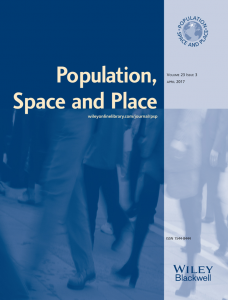Alive Inside: How music can help fight dementia.

Official Poster for “Alive Inside”
What’s your favourite song? Everyone has one. Or maybe, if you’re like me, you have about twenty. Those particular songs, our desert island discs, are powerful. They connect with us at a deep level and can arouse a variety of emotions: nostalgia, empowerment, wistfulness, sadness, ecstasy, maybe even a combination of these. But the potential of music – and particularly our favourite music, goes further than this. The forthcoming documentary ‘Alive Inside’, currently doing the rounds of the film festivals, powerfully illustrates the emancipatory potential of music which has largely gone unnoticed until now. For older people suffering the confusion and loneliness of dementia, music can bring them out of their isolation and help them re-engage with the outside world.
The film starts with the story of Henry, an elderly man who has been in a nursing home for around ten years with dementia so severe he struggles to recognise his own daughter. The social worker Dan Cohen, the ‘star’ of the film, places an ipod on Henry’s ears and plays Henry a song from his youth. What happens next is remarkable. I advise you to watch this video and I dare you not to be moved by it as I was, it really is quite stirring stuff. When I saw this film at the International Documentary Film Festival in Amsterdam recently the whole cinema, including myself, was in tears.
[youtube]https://www.youtube.com/watch?v=fyZQf0p73QM[/youtube]
The remainder of the film is mostly a collection of other similar scenes: old person is shown barely functioning; old person is played some music; old person comes alive; old person then becomes animated and lucid in conversation. But the novelty of the film doesn’t wear off, despite this repetition. Moreover, there is a point to all these tear-inducing scenes. Two points in fact. Firstly, Cohen is questioning the medical model of nursing homes which we inflict on our parents and grandparents. Nursing homes have historically been modelled on hospitals – old people are treated like patients rather than as independent people, and soon enough they become patients due to institutionalisation and a lack of individual freedom. Indeed, soon after my own grandmother was placed in a nursing home, her deterioration into dementia seemed to speed up exponentially.
Questioning the institutional treatment of the elderly is a common theme of the film. In this sense Cohen, and the other experts featured in the film (including the neurologist Oliver Sacks who was made famous by the film adaptation of his book Awakenings), echo the critiques made by the Antipsychiatry ‘movement’ of the 1960s. Then, the likes of Michel Foucault, R. D Laing, Erving Goffman, and Thomas Szasz questioned the institutional treatment of mental health patients, a stance popularised in Ken Kesey’s ‘One Flew Over the Cuckoo’s Nest’. This ‘movement’ was critical of the use of electroshock therapy, the institutional detainment of mental health patients, and the incapacitating drugs prescribed by medical professionals. At one extreme, R. D. Liang was against the whole notion of schizophrenia as an ‘illness’, and saw it more of a logical reaction to a ‘sick society’.
The antipsychiatry movement was broadly dismissed for going too far. Most people today would agree that institutional care, doctors, and drugs are all needed in the treatment of mental illnesses, including those related to ageing like Alzheimer’s disease. But Cohen’s film makes us question the extent to which the ‘nursing home model’ has become so formalised that it risks subsuming human empathy with instrumental logic, viewing residents as patients, and carers as middlemen, there to provide the vast pharmaceutical industry with guaranteed customers. Instead of using drugs to calm and pacify ‘patients’, perhaps music therapy, as shown in this film, could help those suffering from ilnnesses such as Alzheimer’s to maintain their dignity and self-determination, and regain, albeit briefly, their own identity which is so cruelly robbed of them by dementia.
The second point is that we are all living longer. In the UK, there are about 14.7 million people aged 60+ today, but this is expected to pass the 20 million mark by 2030 and continue on an upward trajectory. The huge budgetary implications of this greying population might mean that our existing institutions will attempt to cope with the sheer numbers of people ‘on the cheap’, continuing with the existing medical paradigm of elderly care which just prescribes drugs to its residents/patients, keeping them (or rather, us) pacified and easier to manage. Cohen’s film points out some worrying aspects of our current nursing home model which surely need addressing before even greater numbers of people go through a system which is far from ideal.
One worrying aspect of the film is the rather cold reception which his music therapy ideas receive from nursing home bosses. Cohen sees that all elderly people need for his individualised music therapy to work is a simple ipod and some headphones – an investment of about $40 per person. Yet the existing medical model, which prioritises the use of tight budgets on ‘traditional therapies’ (i.e. drugs) is so entrenched that it’s hard for Cohen, and other advocates of music therapy to get a hearing from managers. I hope that this film will start to change their perception. It certainly changed mine.





1475-6781/asset/JSS.gif?v=1&s=377bb8e0c3d0fcf201f301ded7cf610142072c3e)
1468-0491/asset/society_affiliation_image.gif?v=1&s=859caf337f44d9bf73120debe8a7ad67751a0209)
Medical model versus intrinsic model of treatment continues to be prevalent in our culture coupled with a disregard for our senior citizens. Collectively, we do not see their value and the disruption of memory and ability not clearly dysfunctional enough to consider changing our normative behavior. Yet individuals recognize and attempt on a daily basis to not only argue the value of our elderly but to argue that in the course of memory, the loss is ours, only perceived as theirs. I wonder if as the “baby boomers” slowly creep into this age group if the model will change. Doctor heal thy self!
This point of view is very “refreshing,” to put it simply. The state of our care homes may really be limited and even mediocre. This then serves to be an awakening to solve such condition if possible, for example, like investing in a better facility that offers more freedom and meets the utmost needs of those with dementia, particularly.